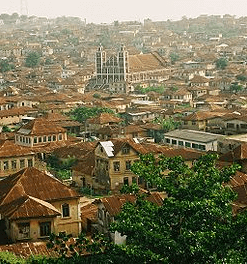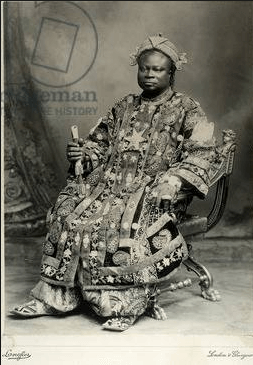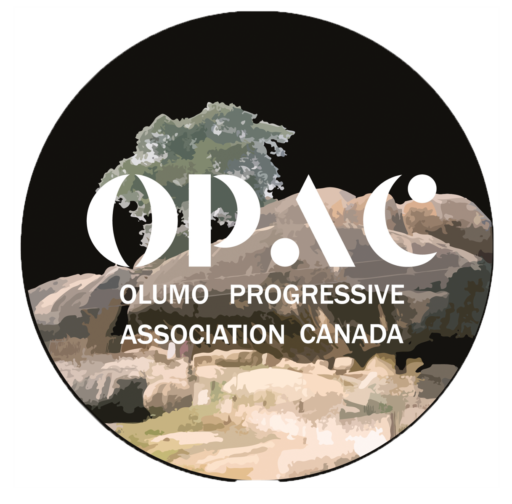The Egba group originally under the Oyo Empire became independent following the spectacular collapse of Oyo in the first half of the 19th century. Wars with Dahomey, in which the Egbas were successful partly due to the protection afforded by the Olumo Rock, led to the founding of the city of Abeokuta, which means “under the rock.”
The Egba nation is made up of the following sub-divisions – the Ake, Owu, Oke Ona and Gbagura, each with its king (historically, the Egba nation is made up of four divisions; Ibara, though geographically located in Abeokuta, is part of Yewaland).

During colonial rule, the British recognised the Alake (or King of Ake) as the paramount ruler of the whole clan and their territory, and so, his successor is referred to as the Alake of Egbaland now. The titles of the kings of the aforementioned sub-divisions are therefore Alake of Egbaland, Oshile of Oke Ona,Agura of Gbagura”, and “Olowu of Owu in order of settlement and seniority in Egba nation (the Olubara is not an Egba king; he is a Yewa king although his domain is located geographically within the present day Abeokuta).
It is worthy of note that the original town and settlement of the Egba nation was under and around Olumo rock, which is in Ikija/Ikereku area of the Egba Oke Ona. The Jagunna of Itoko is always the Chief Priest of Olumo. The area in Ikija, which is Oke Ona, is only an amusement park created as an entrance to the park. The entire Olumo Rock is in the territory of, and under the control of the Itokos. Another reference name for Abeokuta by the founding fathers is Oko Adagba (Adagba’s Farm or Bush) in reference to the hunter that founded/discovered Olumo rock. Adagba went hunting in search of game animal/food from the Obantoko township where his fellow Itoko citizens were stationed while wandering for a settlement.
Egbaland was not only where Henry Townsend lived but also boasted of being the home of the first newspaper in Nigeria (“Iwe Irohin”). Its people serve as the first of the many Nigerian nations (until recently, the only of them) to have had an anthem.

Egba People are multi-talented and have several songs to their credits> The followings are just few amongst others:
- Egba ile ibe nigbagbo ti se wa, Egba ile ibe nigbagbo ti se wa
- Awa Egba lo ni jesu o
Here goes another short one:
- Awa lo mo Abeokuta, ilu rere ilu olola
- ilu to duro lase oluwa, Egba omo lisabi.
Attire
Men ususal wear : *Trousers, kembe/sokoto; *Top, Buba and Agbada; *cap, Fila (a beti aja)
Women usual wear : *Wrapper, Iro; *Top, Buba; *Headgear, Gele; *Others – Ipele – Piece of cloth placed on the shoulder or wrapped around the waist
Food
Among the notable meals in egab are *Lafu, (White Amala) and Ewedu soup.
Some Notable Egba People:
- Olusegun Obasanjo, President of Nigeria from 1999 to 2007
- Chief Ernest Shonekan, Interim President of Nigeria, 26 August 1993 – 17 November 1993
- Fela Kuti, Musician, and activist
- Chief Peter Olakeinde Sogbesan, Jaguna of Orile Imo, Pioneer Permanent Secretary.
- Wole Soyinka, author, activist and Nobel laureate
- F. R. A. Williams, lawyer, Senior Advocate of Nigeria
- Moshood Kashimawo Olawale Abiola, Businessman, and politician
- Lawal Ganiyu Olatunji, Medical Practitioner, and High Chief from idi-oparun, Ago-ika, Gbagura
- Oluseye Monsuru, Structural Engineer FMWH, Abeokuta, From Oke ile-aleru, Gbagura
- Akin Fayomi, Diplomat, former Ambassador to France, Monaco, Liberia.
- Chief Ebenezer Olasupo Obey-Fabiyi- Musician and Evangelist
- Mrs. Olufunmilayo Ransome-Kuti -Human Right Activist and First Mother of Nigeria
- Reverend Oludotun Israel Ransome-Kuti- Clergyman, Teacher, and Principal (April 30, 1891–April 6, 1955)
- Professor Olikoye Ransome-Kuti – pediatrician, activist, and health minister- 30 December 1927 – 1 June 2003)
